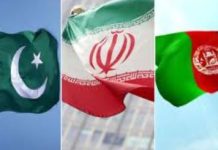It was underscored and appreciated that Saudi Arabia with a population of around 40 million has made great strides in information technology, and its desire to digitize the society has transformed it within a span of less than a decade
Faisal Shiekh
ISLAMABAD, Apr 02 (DNA): Speakers at a roundtable on Saudi Arabia’s E-Governance as a model for Pakistan on Tuesday highlighted that Saudi Arabia with a population of around 40 million has made great strides in information technology, and its desire to digitize the society has transformed it within a span of less than a decade.
The roundtable conference titled E-Governance in Saudi Arabia: Opportunities and lessons for Pakistan was organized here at Islamabad Policy Research Institute (IPRI) in collaboration with WE World News.
CEO National Information Technology Board (NITB), Dr Babar Majid Bhatti was the chief guest, and the forum was also graced by Ambassador Vice Admiral (R) Khan Hasham bin Saddique, who had also served as an envoy in Saudi Arabia.
President IPRI Dr Raza Muhammad, Director Research Brig (R) Dr Raashid Wali Janjua, also participated in the dialogue.
It was underscored and appreciated that Saudi Arabia with a population of around 40 million has made great strides in information technology, and its desire to digitize the society has transformed it within a span of less than a decade.
The speakers said that it is the sagacity of Saudi Arabia to diversify its economy from being oil-based to one on digital revolution. It, likewise, took a leap forward in acquiring the best of talent and expertise from world over in pursuit of setting up an infrastructure for e-commerce and ultimately e-governance.
Dr Bhatti took pride in saying that today Saudi Arabia is number one on the index of countries who have transformed after starting from a scratch in 2017. This primarily is an outcome of its vision to create a backbone of data and to disseminate it in the national mainstream.
He also said that the industry is looking for catalyst and transformers, and not merely those who can sit on the problem by evaluating academic debates. Some of the great accomplishments that came the Saudi way are National Cybersecurity Authority (NCA), a monolithic landscape of development intended to tap the best of talent, and the highest level of commitment from the leadership.
While drawing parallels, it was noted that though Pakistan possesses some of the great talent and industrious initiatives, it is lack of digital foundations that ails it.
This is why Saudi Arabia today is successfully erecting a triangular pyramid of digital society, digital economy and digital governance; and this is rapidly transforming its economy from oil to digital in context.
It was illustrated that the need for any evolving society that wants to digitize it is to have a strategy at the outset and backed by a roadmap of sustainability. The terms used in this context is Business Process Speed Engineering (BPSE), and that forms the crux for development and innovation.
Dr Bhatti observed that Saudi Arabia had laid out a practical strategy with specified objectives, along with a consistent model. He noted that it’s time to relate the academia with the industry, and he coined the idea of having Industry PhDs. Moreover, Saudi Arabia had proved that Research & Development needs to go hand-in-glove with industry, academia and the government.
Vice-Admiral Hasham noted that Saudi Arabia is number four in terms of Smart Cities in the world, and the credit goes to the personal involvement of Saudi leadership and Crown Prince Muhammad bin Salman deserves praise for it. The fact that he sits on many of the boards related to development and digital context makes him lead from the front, it was pointed out.
Ambassador Hasham said that 85 percent of Saudi society has access to E-governance, and this is no mean success. Likewise, more than 50% of its revenue at moment is from non-oil resources.
The participants pointed out that Pakistan’s fundamental problem as it takes the digital and e-governance route is lack of facilities to opt for digital financial transactions. This aspect must be studied at length, and similarly by setting up smart cities, Pakistan can address many of its governance-related problems in a better way by documenting it on digitization.
In this regard, stress was laid on digital literacy in Pakistan and the need for a transparent infrastructure. Irritants such as high cost of energy, lack of infrastructure and absence of regulations are hindering Pakistan from making strides in e-format headway.
The discussants evolved that a state-sponsored policy to facilitate private sector is the need of the hour in order to harness the best of potential that Pakistan possesses, and streamline the same into e-governance.
It was also noted that e-procurement can cut down 60% of transaction cost, and boost efficiency. The reason why Saudi Arabia has progressed is that it has taken out red-tapism from its bureaucracy, and evolved it on a format of ease-governance.












